
You are logged in as
Logout
You are logged in as
Logout
"We as a College work hard to provide all students with opportunities to explore new experiences through our co-curricular programme, support their learning with appropriate structure and clear expectations while developing creative and critical thought through discussion and debate."
Dear Parents and Caregivers
Kia ora koutou katoa
The second half of Term 2 has been packed with various sporting and cultural events, while at the same time senior students have been juggling the demands of assessments and internals. In a school where there is so much choice available to students it can be difficult to manage competing demands and priorities. I hope that all will take advantage of the coming term break to take some well-earned time out from routines, timetables and ‘to do’ lists.
Recently I and other staff have been witness to a number of student speeches in a variety of contexts. The Festival of the Spoken Word speech finals, the Ngā Manu Korero speech competition, and a chapel address from two students on our commitment to community service and the Cambodia trip.
On all of these occasions I was impressed with the maturity and thoughtfulness of our young people. There is no doubt that as they move to life beyond school, our teenagers have a challenging world to navigate. The ‘VUCA’ World – one which is volatile, uncertain, complex, and ambiguous, requires young people who can make sound judgements based upon knowledge, consideration of different perspectives, and understanding the consequences of decisions and actions.
Schools are a place where students are encouraged to try new things and test their perspectives. Sometimes they will make mistakes and their judgement will let them down. They are, after all, teenagers. It is from these mistakes that they will readjust their perspective, respect alternative viewpoints, and learn the value of collective rules and boundaries which are important for communities to thrive.
We as a College work hard to provide all students with opportunities to explore new experiences through our co-curricular programme, support their learning with appropriate structure and clear expectations while developing creative and critical thought through discussion and debate. We also aim to provide scope for freedom of thought and expression within appropriate boundaries. By encouraging students to discover their true selves in a way that shows respect for others and our school, we can make St Andrew’s College a safe place for all.
Recent weeks have been particularly busy for our music groups with the Big Sing, Chamber Music group competitions, Rockquest, and music concerts. The opportunity for all Year 7–8 students to perform in the Preparatory School production, The Aurora Stone, was also a highlight for many. When I meet with Old Collegians it is often these moments, be they in sports, performance, or outdoor education, that feature prominently in their school memories.
Over Matariki weekend, I had the ‘pleasure’ of celebrating the ‘Golden Girls’ year with 15 friends, many of whom have been in my life since school and university days. In a weekend of laughter, fun, and lots of chats, many stories and memories were shared. We reflected how much these had influenced our choices and opportunities in later life. It is one of the joys of teaching to know we are helping to shape young lives in ways we will never know.
Thank you for the way you support teachers and staff in their collective efforts for St Andrew’s College to be the best we can be.
Best wishes for a good term break.
Kia noho haumaru koutou katoa (may you all stay safe).
Christine Leighton
Rector

The unexpected and tragic passing of Lucca Gibbons showed the strength of St Andew’s College and the wider community in its ability to rally around and support each other in tough times. A big thank you to Head of Guidance, Tom Matthews, and the counselling and pastoral care teams for the work they did supporting the Gibbons family and our students in such a sad and challenging time.
Term 2 has been ‘business as usual’ with students participating in The Big Sing and Chamber Music competitions, the Boys’ and Girls’ Assemblies, the Ngā Manu Kōrero speech competition, interschool exchanges, and our extensive co-curricular programme.
Many of our top sports teams are once again tracking well this season with many teams still in contention for their playoffs in Term 3. Unfortunately, we have had a number of concussions this year in a range of sports. Our College Nurse, Josie Gunning, has put together a comprehensive information sheet to be used by coaches, managers, and parents when they know or suspect a concussion may have occurred. Please click here for more information.
I always make a real point of visiting our portfolio Scholarship classes at this time of the year. I am so grateful that the students are so willing to present and share their work with me and engage in a conversation about what is exciting them about their learning. Once again, the large numbers and quality of the portfolios are impressive.
The first set of reports will have been, or are about to be, made available to you. Your child’s teachers have spent a considerable amount of time providing quality feedback on what is going well and what the next steps need to be. Can I please encourage you to have a conversation on how they may learn from the feedback and where appropriate make some changes.
Follow-up meetings to the Parent-Tutor-Student Conferences held at the beginning of the year are scheduled for Tuesday 23 July. You will receive information about these this week, and the meeting times will be booked in the same way as they were at the beginning of the year. Please note that you will have the option of having an online or in person conference. The conferences provide a valuable opportunity to review how the first two terms of the year have gone, to reflect generally on the goals that were set at the first conference, discuss academic progress and well-being, and share any persistent problems or issues. It is expected that the students will take the lead in these discussions, but we also value your input. The key goal is to ensure that your child feels supported. Classes will begin again on Wednesday 24 July.
We have once again been hit hard with student illness, especially with the flu. This has the potential to disrupt the learning of your child and their ability to achieve to their potential in assessments, especially in NCEA. Can you please urge your child to use the College’s NCEA assessment extension process when they are/have been ill, and they believe their performance may have been impaired in some way. Please note that a medical certificate needs to be supplied as part of this process. Can I also ask you to let the school know as soon as possible if your child is going to be away from school and give a specific reason for their absence.
It is with sadness that we farewell three of our teaching staff at the end of this term. Conrad Wing, a much respected and loved member of the Mathematics Department, and his wife, Linda Garden, a fine English and ESOL teacher, are saying goodbye after seven and a half years at St Andrew’s College to take up teaching posts in Japan at a top international school. We also say goodbye to Jo Andrew. Apart from teaching Social Science and Tikanga, Jo has led our very successful netball programme. It would be fair to say that she leaves the programme in an excellent place, both in terms of numbers and quality coaches. Jo will be taking on the leadership of a boarding house at one of Sydney’s top independent schools. We wish all three teachers the best for the next chapter of their lives. The classes will be covered by Shynae Rigter, who will be joining us from the Auckland International College, and three of our current part-time staff, Chris Dickson, Dom Urmson, and Christine Fildes, who will be taking on more hours.
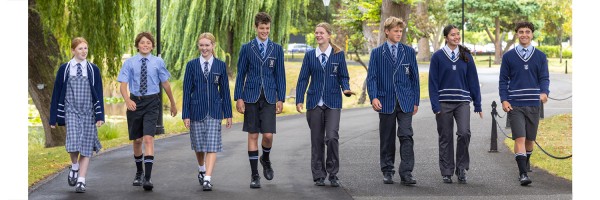
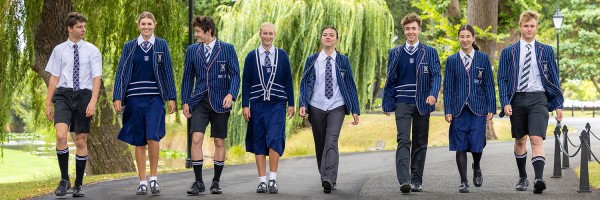
The way the students are wearing their uniform at school has improved this year. Only minor issues persist, such as dirty shoes and unshaven faces for some of the boys, and too many earrings for girls. Please remind your child they must leave the school grounds in school uniform with their blazers on. The only exception to this if they are going to a sports match.
Please encourage your child to balance the work set by their teachers and time for relaxation during the school holidays. I hope you all enjoy having your children at home for the next couple of weeks.
Evert van Florenstein
Head of Secondary School
Deputy for Rector

JULY
5 End of Term 2
JULY
22 Staff Professional Development Day
23 Term 3 starts
23 Years 9–13 Tutor-Whānau Conferences – No Secondary School classes
24 Secondary School classes resume
28 StAC Attack
AUGUST
3 Senior College Formal
Please view the fixtures on the College intranet for more upcoming events. The intranet is updated daily.3

“We can complain because rose bushes have thorns or rejoice because thorns have roses.”
― Alphonse Karr
Over the last few weeks in chapel, we have been looking at perspective and how perspective influences our outlook on life. In one of the most well-known parables in the gospels, Jesus tells of a son who wishes to leave home early. He asks his dad for his inheritance. In doing this he is wishing his father dead, and he takes off to another land. His lavish lifestyle is short lived and his perspective of home, his father’s love, what the world offers, and his own selfishness are put in the spotlight. Living in another place, experiencing the emptiness of materialism, loneliness, encountering suffering, and challenging experiences opens the son’s world to another perspective. His foolishness is quickly revealed, and he begins to long for the comforts of home, boundaries, teamwork, community, authentic connection, grace, and unconditional love.
Last Thursday two of our Year 13 prefects, Timothy Richardson and Libby McNee, spoke in chapel about their experience on the school’s service trip to Cambodia in the last holidays. Their newfound perspective opened their eyes to a world that didn’t have a lot, and yet experienced joy in the simple things in life. Being grateful for what you have was a strong message that Tim and Libby expressed. Their experience had brought them a fresh perspective, a different lens through which to look at the world and their life.
I have recently returned from three weeks in Australia. As part of my sabbatical, I visited six colleges: St Andrew’s Anglican College on the Sunshine Coast, Cannon Hill Anglican College and Churchie Anglican Church Grammar School in Brisbane, All Saints in Robina Gold Coast, and Barker College and St Andrew’s Cathedral College in Sydney. Visiting other colleges has given me a fresh perspective into chapels and chaplaincy, pastoral care, service learning, and Religious Education Curriculum. I have new ideas, but I also have a greater understanding and gratitude for what St Andrew’s College offers and the care we provide for our community.
We have a wonderful College and caring community. This has been highlighted through the difficult and most challenging circumstances we have endured as a College community over the past few weeks. The deaths of Nigel and Marjan Joyce, Lucca Gibbons and Old Collegian, Tatiana (Tee) Keogan (OC 2021), has rocked our community to its core, and yet, through adversity and deep grief, we have wrapped our loving arms of care and support around those who have allowed us to meet them at this time of need. We have grown and witnessed a love, I believe, few communities would get to experience. I feel very proud and grateful to our St Andrew’s community; staff, board members, students, parents – past and present, and Old Collegians. Thank you for caring without boundaries, being gracious, kind, and loving unconditionally.
I wish you all the very best as you take time over the next couple of weeks to refresh, enjoy the company of those you love, reach out to those for whom distance may have come between you, and where you gain a renewed perspective for the small, challenging, and good things that make your life.
Grace and peace
Rev. Paul Morrow
College Chaplain

As educators, we believe that the path to success for our students lies in fostering their sense of responsibility and ownership over their own learning. In today’s rapidly changing world, it is crucial that students become active participants in their educational journey. By instilling a sense of ownership, we empower them to develop essential skills and attitudes that will serve them well beyond the classroom walls.
Taking ownership of learning means more than just completing assignments and studying for tests. It involves students actively engaging in their education, setting goals, making decisions, and reflecting on their progress. Here are a few reasons why this approach is vital for your child’s development:
At St Andrew’s College, we are committed to creating an environment that encourages students to take ownership of their learning. We invite you, as parents, to support and reinforce this mindset at home. Encourage your child to ask questions, explore their passions, and take responsibility for their academic journey. Together, we can empower our students to become confident, self-directed learners prepared to thrive in an ever-changing world.
We start next term with a wonderful opportunity to reinforce this approach with Parent–Student–Tutor Conferences on Tuesday 23 July. All students have been working on a reflection and goal-setting task in preparation for these interviews. They have been asked to reflect on their mid-year reports and set WOOP goals for the remainder of the year, as well as complete a reflection task that links to our well-being framework, PERMA-V. I strongly encourage you to engage in this process and be involved in these conferences.
Term 2 has been an opportunity for Middle School students to really get involved in the life of the College. It is my hope that students have established positive friendships, are involved in the range of co-curricular opportunities, and are enjoying their learning in the classroom. Term 2 always presents its challenges, whether it be academic loading, illness, or simply dealing with the colder weather. However, I hope that students can keep themselves in a good space by staying positive and getting stuck in. Well done to all for their involvement.
I wish everyone well for the upcoming holidays and I am looking forward to seeing you all in Term 3 when classes start on Wednesday 24 July, following the conferences on Tuesday 23 July.
Matt Parr
Head of Middle School

Kia ora koutou
Last week we celebrated a mid-Winter Christmas organised by the Senior College Council.
Students from the Council stayed late on Friday night the week before to decorate the Common Room and atrium areas with streamers, decorations, window art, and two Christmas trees. They spent several hours the previous evening baking 550 gingerbread biscuits and gave these out with hot chocolate on Monday morning as a kick-off to the week. The aim was to provide a winter boost to students as we move into the last week of term, and to battle the urge to stay in bed every morning! It was a great success, and a wonderful morale boost after some difficult weeks in our school community.
This is Senior College life at its best, with students stepping up to build on our philosophy of interdependence, or living in community. It is such a privilege to have group ‘happenings’ where we can come together and celebrate, and where the role of school as a community builder can be acknowledged. Congratulations to the Council for all of their hard work.
We are looking forward to tomorrow’s annual Prefects’ Assembly. The team have been working hard to write scripts, film segments, practise dance moves, and plan the ‘Formosal’ (where a member of the team asks an unsuspecting student to come to the Senior College Formal with them). We’ll also be giving Developing Positive Relationships (DPR) Awards to one Middle School and one Senior College student to recognise how they have demonstrated these values. The DPR values are faith, respect, hope, compassion, honesty, generosity, and responsibility, and the awards are decided by students nominating their peers. You are most welcome to attend the assembly if you’d like to see the results of all this planning and rehearsing.
I hope you all have a chance to relax and recharge in some way over the school holiday period. It has been another challenging but productive term!
Ngā mihi nui ki a koutou.
John Ruge
Head of Senior College

Next term begins with a Teacher Only day (no classes) on Monday 22 July, followed by Parent-Whānau Conferences on Tuesday 23 July. Classes for all students begin on Wednesday 24 July. Students must be at school by 8.30am for tutor group meetings.
We encourage parents and whānau to attend these meetings with students and their tutors. It’s a really important chance to check in with the big picture of how things are tracking for your child. We use the PERMA-V well-being framework to give students an opportunity to reflect on all aspects of their school life, and students will have spent some time in their tutor groups this term preparing some thoughts on each of the elements of this framework: positive emotions, engagement, relationships, meaning, achievement, and vitality.
Booking information is available through the email you will have received in the last few days.
If your child drives to school, either regularly or intermittently, then they must register their vehicle with the office. This is regardless of whether the student owns the car. We have had several instances this year where we have been able to help students avoid a flat battery or being towed because they had registered a vehicle with us. Please note that:
Thank you for your help with this.
Boys need to be clean shaven every day. Frequency of shaving will vary for individuals, but the basic rule is the same. If boys are not clean shaven at school, then we have a supply of the razors and shaving foam in the Senior College office.
Girls may wear one plain stud in each ear lobe. Nail polish and jewellery are not permitted.
The Formal is now only a few weeks away and the Senior College Council have been working very hard to organise what promises to be an amazing evening. A quick reminder about logistics and expectations for the evening:
The College does not endorse any pre- or post-Formal functions. Where they do occur, we expect that all functions are by invitation only and are hosted and supervised by responsible adults. If you intend to hold a function it would be helpful if you could email me at JRU@stac.school.nz to let me know the details.
You are warmly invited to join us at this service. Students must attend at least three chapel services each year. The only exception is if a student is representing the College at another event and has been excused from this service and from a catch-up requirement. Students should wear full uniform, including blazer, and should be at the Chapel by 6.45pm at the latest for roll checks.
Our school examinations are very important for students as a practice run for NCEA externals and as the basis for derived grades. This year they will be held Wednesday 11 – Friday 20 September (Weeks 8 and 9 of Term 3). There will be more detailed information for you in the next edition of On Strowan.
As we come to the end of a busy Term 2 for the co-curricular programme, it is pleasing to reflect on our high participation rates and some significant achievements. At times the weather has proved to be a challenge for outdoor sport and the students are to be commended for the way they have adapted to the challenges we have faced with this. During this term we have had many sporting and cultural highlights across the co-curricular programme, including two sports exchanges.
In Term 3 we are looking forward to another Winter Tournament Week, where 15 teams from seven sports will compete in a number of tournaments from Whangārei to Dunedin.
Mark Lane
Director of Sport and Cultural Activities
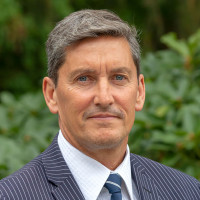
Throughout the year I have worked my way around a lot of the co-curricular sports and activities that we do during the week and over the weekend. It has really been pleasing to see the commitment of our young people and the support they have from their families. With that in mind I was reading a wonderful article that resonated with me and thought that I would share it with you. I hope you enjoy it.
In 2015, Chris Harwood and Camilla Knight published an academic paper titled Parenting in youth sport – a positioning paper on parenting expertise. In this paper Harwood and Knight proposed that there are six key core competencies that expert sport parents demonstrate in order to boost the chance of their children: achieving their potential in sport; enjoying and consequently staying involved in sport; and benefiting from sport’s potential to support positive development outcomes.
Parents support children in sport in various roles and ways. Harwood and Knight have outlined the following as the six key competencies that inform sport parent expertise:
Armed with the right knowledge, parents not only support their children in playing sport, but also help them to choose a sport offering that will best suit them.
This is important, as parents (of younger children in particular), are well placed to consider the fit between their child and a sport (i.e., will a child love a sport?). When considering fit, parents need to consider the biological, psycho-social, and emotional needs and wants of their child. Different sports will have attributes that inherently fulfil young people’s needs differently (team sport vs individual sport, contact sport vs non-contact, etc.). Also important for parents to consider is the respective contexts, communities, and settings of the sport (e.g., how much emphasis does a club/school place on competition?).
The affinity a child may develop for a sport will then ultimately have an impact on how long they will remain involved in a sport. Before signing up for sports, parents should first have conversations with their children, understand and listen to them around what they want to do and why.
While parents are well placed to think about the fit between their child and a given sport, supporting children to find the sport that best fits them is complex. This is why it’s beneficial for parents to encourage their children to be exposed to a range of sports early on. Other key focuses parents should look out for include: the prioritisation of fun; that coaching is predominantly done through play or games; that selection and participation opportunities reflect a long-term focus on development; and competition is used in a developmentally appropriate manner (i.e., format of sport is appropriate for age and stage of child, and level of emphasis on winning is appropriate for age and stage of child).
Expert sport parents take time to learn the trade of being a sports parent. Underpinning this includes:
All this active support should reflect the child’s enjoyment and self-esteem in their sport.
As they progress, some youngsters will naturally want to reduce their range of activities to take their chosen sport more seriously.
In those cases, it’s up to parents to seek out the right coaching and training programmes to enable their children to do that while still having fun.
Parenting styles have an important role to play in creating a healthy emotional climate for children.
Parenting styles are reflected in the way a parent interacts with their child, and the parents’ values and expectations. Parenting styles can be mapped into four types along two axis representing level of responsiveness and warmth, and level of demandingness and control.
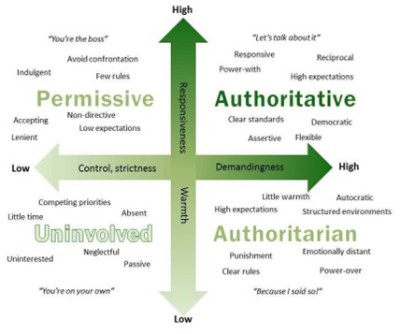
An organisation of four parenting styles based on two parental dimensions: the level of parental control on the x-axis and the level of parental warmth on the y-axis. Source: www.psychologyinaction.org
Research has shown that generally greater positive outcomes are achieved in youth sport when the experience is underpinned by parents demonstrating an authoritative parenting style.
In simple terms, authoritative parenting is autonomy-supportive. This style of parenting provides the right balance is transparent structure to children, with flexibility for children to have high levels of self-determination to support their growth and development.
Examples of this might look like:
The need for parents to supervise and/or get their child to and from sports means they are frequently on the sidelines.
But often parents’ heightened emotions get the better of them and that has a detrimental effect on our children.
As studies show, we know parental reactions are often the result of empathy for their child, the emotional intensity of the game, and the perceived knowledge and experience of sport.
Children’s emotions, opponent behaviour, and parent interference are often sources of frustration too.
Any anger usually comes down to perceived unjust behaviours from coaches, referees, uncaring behaviours from coaches, athletes, and other parents and perceptions of coach or referee incompetence.
An example of this is a parent who stormed onto a rugby field during a tournament and hurled abuse at the referee after a call he didn’t agree with, in front of the two young teams and everyone else on the sidelines.
Managing such emotions is key when it comes to supporting children and it will enhance the experience for all involved, not put them off. It also serves to model back to children good emotional intelligence.
It’s about mastering that whole range of emotions, for instance the disappointment or worry they feel or share with their child when their child is upset or disappointed, or the embarrassment they feel as helpless bystanders if their child is underperforming or behaving poorly.
As studies show, youth prefer support without pressure, which means parents need to avoid providing technical or tactical advice, ensure comments focus on effort and attitude rather than performance or outcome, and give practical advice only to help them prepare and recover from games.
It’s a matter of respecting sideline etiquette and remaining positive – cheer, be encouraging during and afterwards, give praise and empathy.
For those who really struggle to adjust, ask for tasks at competitions, and take up opportunities to socialise and become better educated around the values and benefit of sport without the focus on winning.
If parents can control their own emotions and behave in manners appropriate for the sport, it will impact on their own enjoyment.
An emotionally intelligent sport parent is one who understands their child’s emotional needs, appreciates values such as effort, sportsmanship, independence, honesty, composure, and constructive feedback, and demonstrates behaviour that role models these values to their child.
Parent relationships with children, coaches, and other parents is vital when it comes to creating a positive youth sport environment. When children participate, they interact with a range of people, including other children’s parents, coaches, officials, and organisers, and it’s no different with parents.
The quality of those relationships comes down to a number of factors outlined by players in one study – self-esteem, enhancement and supportiveness, loyalty, things in common, companionships and play, and how you deal with conflict. In relationships where those factors were present, it resulted in higher levels of player enjoyment, perceived competence, self-determination, motivation, and lower stress levels. Parents in the same space developed positive coach–parent relationships, built trust and understanding, and appreciation for their work.
In fact, through positive interactions and behaviours parents can minimise a coach’s stress by doing the simple things well, things like accepting the coach’s authority, not undermining their leadership, particularly in front of the athlete, and supporting the coach behind the scenes without interference. It’s also about developing knowledge of the sport, listening to the coach on various issues such as schedules, competition, rest, and recover, so the child gets the maximum benefits.
Healthy relationships with other parents are also vital and can diffuse situations. Angry interactions, interference, shouting, cheating, and negative comments are all stressors for parents – they inevitably damage relationships and impact negatively on children’s experiences and relationships with other children.
Instead foster healthy parent-to-parent relationships, create a social network where they can feel a part of a sporting community, and have their own social needs met at trainings and games. It will allow parents to become aware that developing and maintaining such relationships are beneficial for their children, other children, coaches, parents, and themselves as well.
While parents can influence the youth sport environment, so too can the youth sport environment influence parents. Financial demands can affect personal, social, and broader family life choices, while organisational demands may include finance and time commitments which can upset the sport–work and sport–family balance. It can even create strained relationships at home between parents and siblings, resentment, and guilt due to lack of attention of non-sport siblings.
Coaching behaviour, club, and national body processes can cause stress too – lack of communication, lack of feedback from coaches, funding criteria, selection decision, and the pressures of talent development systems can all contribute.
Developmental demands can include decisions around coaches, training and programmes, and concerns a concerted effort in one sport may mean they miss out on other hobbies and activities which, in turn, causes uncertainty of their child’s future while trying to manage sport and school pressures. Such demands can affect a child’s ongoing development, decision-making, support needs, and even career transitions down the track.
It’s vital that parents develop and apply various coping skills and strategies to manage these diverse demands. When they successfully do this, they strengthen their ability to help their child navigate through the demands and uncertainties of sport.
As children grow and develop through sport, parents’ roles, experiences, demands, and responsibilities change along the way. It’s up to parents to recognise and successfully negotiate their shifting roles as children transition through the stages of athletic development.
As a child navigates first-time challenges parents may focus on attitude, value, and character development as they begin their role as educator and supporter. When children transition to the specialising stage and involvement intensifies, parents must also transition. It’s a time when parents may become more involved at an organisational level, where logistics come into play, and where providing emotional, motivational, and moral support to their child is most important.
With a child’s growing independence, it’s even more important to keep communication lines open around decision making, to ensure demands of a potential career and education are made. At that stage, coaches begin to take on more expert support roles and parents more provider roles, and in the background.
Negotiating this shift can be stressful and challenging, as parents are no longer close to the centre of their child’s sporting world. At the end of the day, it’s up to parents to adapt to provide that unconditional support and a safe haven for their young adult as they develop their independence and pursue their sporting and life goals.
Sporting parents face a whole lot of responsibilities around managing and supporting the needs of their child, managing themselves and their well-being, fostering and managing relationships, and dealing with organisational demands and processes within the youth sport environment.
While parents form a necessary part of the fabric of youth sport, not everyone when they become involved in sport possesses the knowledge, skills, or understanding that underpin ‘sport parenting expertise’.
It’s important for clubs, organisations, and coaches to help build the competencies and skills of parents, to ensure a healthy sport experience and environment is maintained. For these organisations, the likes of online resources, workshops, or meetings can help parents understand, gain confidence, and expertise in their role. Working with coaches on relationship management and parents on relationships with others is also key.
Being proactive, educating and supporting parents will go a long way to developing excellence and expertise in sports parents, and create positive experiences for children at the same time.
Five of our Pipe Band members will travel to Canada on Tuesday 2 July to attend Penticton Highland Games, Vancouver and will gain valuable experience at the Piping Hot Summer Drummer School at Silver Star Mountain Resort.
The Highland Piping Society of Canterbury will run two indoor solo piping contests on Sunday 4 August and Sunday 15 September. The events will be hosted at St Andrew's College in the Spiro Science and Mathematics Centre.
The New Zealand Young Piper of the Year 2024 is major solo piping event is held in Nelson during the Term 3 holiday on Saturday 5 October.
The Canterbury Drummers Club will run an indoor solo drumming event in September with the date to be advised. The contest will also be hosted at St Andrew's College in the Spiro Science and Mathematics Centre.
Experience the thrilling sounds of StAC Attack 2024! A St Andrew’s College Pipe Band event at the prestigious Christchurch Town Hall – James Hay Theatre, this highly anticipated showcase guarantees an unforgettable evening of traditional Scottish entertainment.
Immerse yourself in the rich harmonics of the bagpipes, the infectious beat of the drums, and the flair of the Highland dancers as they take the stage. With talented St Andrew's College students from Years 4–13 displaying their skills, StAC Attack promises to be an action-packed performance.
Be a part of the magic at StAC Attack 2024!
When: Sunday 28 July 2024
Time: 5.00pm – 7.00pm
Venue: Christchurch Town Hall, James Hay Theatre
Tickets: Adults $49.00, students/children $29.00 (student ID may be requested).
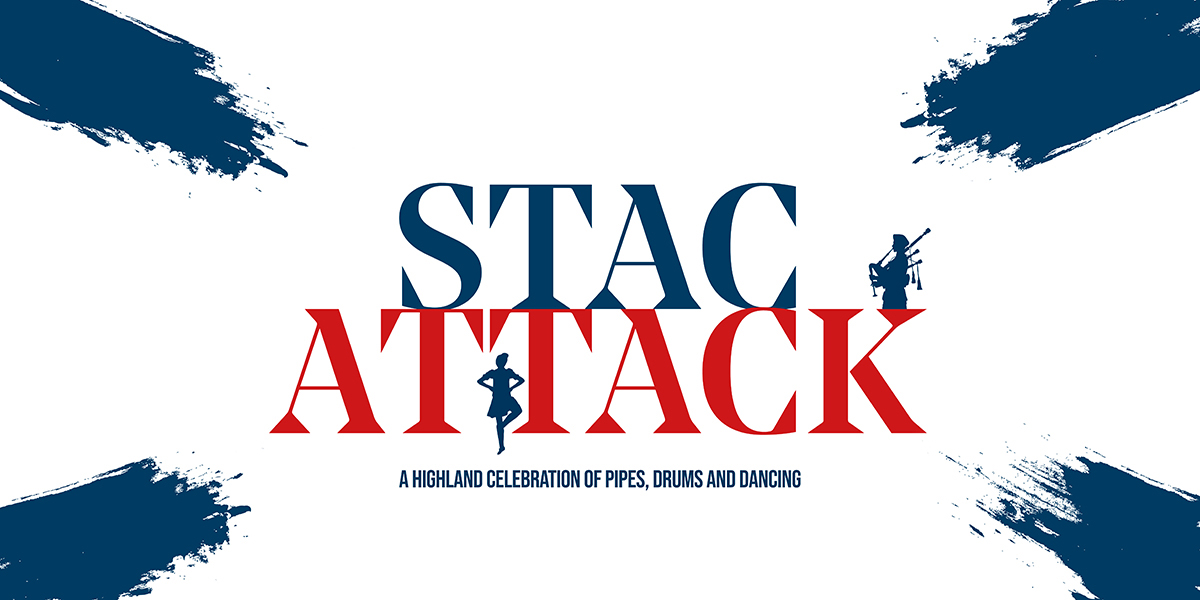
It’s been a very full term for the Performing Arts Department.
Senior Production – Legally Blonde, Rockquest, Rock Night, Big Sing, Chamber Music competition, Jazz Combo competition, and Preparatory School Production – The Aurora Stone, plus rock school recording sessions!
Thank you to all staff who support the students in these opportunities.
The term finishes with a Performance Evening and 90 students attending the schools’ matinee of Something Rotten. We wish everyone a relaxing break after the busy term.
July – Play It Strange – Lion Foundation
7–10 August – Southern Jam, Blenheim (Big Band and Soul Band only)
19–23 August – Cultural Week and Cultural Assembly
Please view the fixtures on the College intranet for more upcoming events. The intranet is updated daily.
Visit the College intranet, StACNet >